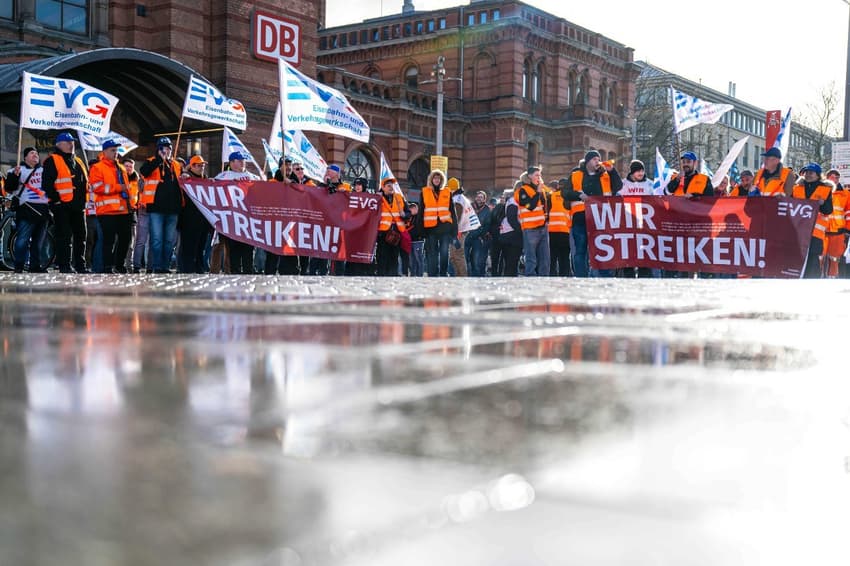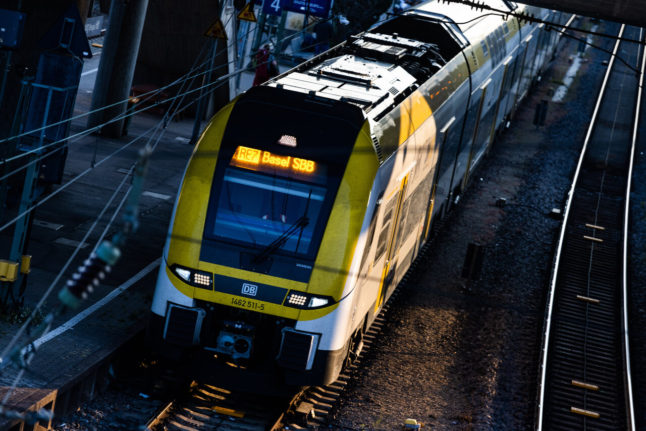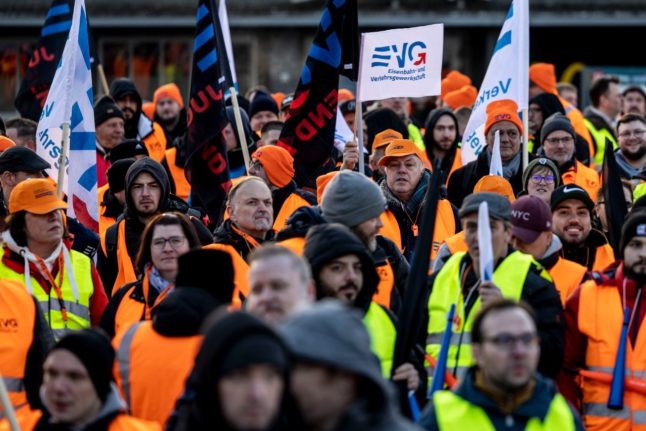Will a €410 pay rise be enough to prevent more rail strikes in Germany?

An arbitration committee has recommended a €410 a month pay rise for German rail works over two years - the biggest hike in the history of Deutsche Bahn. Will the deal be enough to avert unlimited rail strikes in September?
With almost a week left to go, the committee in charge of brokering a pay deal between Deutsche Bahn and its workers announced on Wednesday that a recommendation was coming.
The result is a €410 monthly pay rise in two phases, with the first €200 pay rise coming in December 2023, and the second €210 pay rise following in August 2024. In October, employees would also get a €2,850 tax-free bonus to compensate for high inflation.
There would also be improvements to employees' working conditions - including in logistics branch DB Cargo - and a new company-wide minimum wage of at least €13.50 per hour.
Meanwhile, apprentices and working students would receive a tax-free bonus of €1,425 and a half wage-increase in two steps, higher rent allowances and exam subsidies and more flexible time off around exams.
If accepted by both parties, the agreement between Deutsche Bahn and rail union EVG would run for 25 months, during which time strikes would be ruled out. This would then be followed by a further round of talks to negotiate the next agreement.
That means the proposals could bring an end to months of uncertainty for rail passengers - at least for the next two years.
Alternatively, if union EVG decides not to accept the offer, it could lead to what's known as unlimited strikes - industrial action that carries on until a resolution is found.
READ ALSO: The transport strikes that will hit passengers in Europe this summer
'Absolute limit'
In a statement on Wednesday, state-owned rail company Deutsche Bahn signalled that it was minded to accept the deal.
"We welcome the recommendation of the arbitration team, even though it takes us to the absolute limit of what is economically feasible," said DB's chief HR officer Martin Seiler.
"The settlement recommendation honours the enormous achievements and successful work of our employees. It truly was not an easy road, but after hard wrangling, a solution is finally on the table."

A regional Deutsche Bahn train bound for Basel leaves Freiburg main station. Photo: picture alliance/dpa | Philipp von Ditfurth
On EVG's end, however, things are little more complex. The committee first has to decide its position on the recommendations by Friday and will then conduct its first strike ballot in 30 years.
"We are writing to all members of the 180,000 Deutsche Bahn employees by post," EVG chair Martin Burkert told the Augsburger Allgemeine. "Because of the holidays, the whole process will take until August 31st."
Depending on what is decided in the membership ballot, the agreement could be signed in September, paving the way for the bonus payout in October.
READ ALSO: Massive traffic jams expected as Germany enters one of busiest travel weekends
Uncertain outcome
In the arbitration process, CDU politician Thomas de Maizière had advocated on behalf of Deutsche Bahn, while EVG had been represented by SPD labour law expert Heide Pfarr.
Announcing the proposals, de Maizière branded the deal "biggest and most expensive collective agreement in the history of Deutsche Bahn".
However, the recommendations are much closer to the latest offer from Deutsche Bahn - an offer rejected by EVG back in June - than they are to the union's demands.
In the last round of negotiations between the two parties, DB had been willing to pay out a €400 pay rise in two stages, with the agreement lasting 27 months.

Demonstrators from the EVG rail union gather in front of Duisburg Hauptbahnhof during a strike in March. Photo: picture alliance/dpa | Christoph Reichwein
EVG, meanwhile, had called for €650 per month minimum pay rise for all workers, with a duration of 12 months.
The union had taken a harder line in its talks with DB after settling for a longer collective agreement back in 2021 - a decision that had left its members unable to negotiate a better deal during months of record-high inflation.
Nevertheless, it has also been reluctant to take national strike action - agreeing to a last-minute arbitration process on June 28th rather than conducting a ballot for unlimited strikes as it had previously planned to do.
READ ALSO: German rail union agrees to postpone strikes with third-party mediation
These longer term strikes could still be on the horizon in September if EVG rejects the mediators' proposals. This could come as the smaller train drivers' union GDL sits down for its own talks with Deutsche Bahn.
In the past, GDL has been much more willing to call national strikes on Germany's rail network.
However, calling unlimited strikes - if EVG chooses to do so - is not an easy decision. Not only could rail services be paralysed for weeks, but employees would also forfeit their pay for the duration of the industrial action.
Comments
See Also
With almost a week left to go, the committee in charge of brokering a pay deal between Deutsche Bahn and its workers announced on Wednesday that a recommendation was coming.
The result is a €410 monthly pay rise in two phases, with the first €200 pay rise coming in December 2023, and the second €210 pay rise following in August 2024. In October, employees would also get a €2,850 tax-free bonus to compensate for high inflation.
There would also be improvements to employees' working conditions - including in logistics branch DB Cargo - and a new company-wide minimum wage of at least €13.50 per hour.
Meanwhile, apprentices and working students would receive a tax-free bonus of €1,425 and a half wage-increase in two steps, higher rent allowances and exam subsidies and more flexible time off around exams.
If accepted by both parties, the agreement between Deutsche Bahn and rail union EVG would run for 25 months, during which time strikes would be ruled out. This would then be followed by a further round of talks to negotiate the next agreement.
That means the proposals could bring an end to months of uncertainty for rail passengers - at least for the next two years.
Alternatively, if union EVG decides not to accept the offer, it could lead to what's known as unlimited strikes - industrial action that carries on until a resolution is found.
READ ALSO: The transport strikes that will hit passengers in Europe this summer
'Absolute limit'
In a statement on Wednesday, state-owned rail company Deutsche Bahn signalled that it was minded to accept the deal.
"We welcome the recommendation of the arbitration team, even though it takes us to the absolute limit of what is economically feasible," said DB's chief HR officer Martin Seiler.
"The settlement recommendation honours the enormous achievements and successful work of our employees. It truly was not an easy road, but after hard wrangling, a solution is finally on the table."

On EVG's end, however, things are little more complex. The committee first has to decide its position on the recommendations by Friday and will then conduct its first strike ballot in 30 years.
"We are writing to all members of the 180,000 Deutsche Bahn employees by post," EVG chair Martin Burkert told the Augsburger Allgemeine. "Because of the holidays, the whole process will take until August 31st."
Depending on what is decided in the membership ballot, the agreement could be signed in September, paving the way for the bonus payout in October.
READ ALSO: Massive traffic jams expected as Germany enters one of busiest travel weekends
Uncertain outcome
In the arbitration process, CDU politician Thomas de Maizière had advocated on behalf of Deutsche Bahn, while EVG had been represented by SPD labour law expert Heide Pfarr.
Announcing the proposals, de Maizière branded the deal "biggest and most expensive collective agreement in the history of Deutsche Bahn".
However, the recommendations are much closer to the latest offer from Deutsche Bahn - an offer rejected by EVG back in June - than they are to the union's demands.
In the last round of negotiations between the two parties, DB had been willing to pay out a €400 pay rise in two stages, with the agreement lasting 27 months.

EVG, meanwhile, had called for €650 per month minimum pay rise for all workers, with a duration of 12 months.
The union had taken a harder line in its talks with DB after settling for a longer collective agreement back in 2021 - a decision that had left its members unable to negotiate a better deal during months of record-high inflation.
Nevertheless, it has also been reluctant to take national strike action - agreeing to a last-minute arbitration process on June 28th rather than conducting a ballot for unlimited strikes as it had previously planned to do.
READ ALSO: German rail union agrees to postpone strikes with third-party mediation
These longer term strikes could still be on the horizon in September if EVG rejects the mediators' proposals. This could come as the smaller train drivers' union GDL sits down for its own talks with Deutsche Bahn.
In the past, GDL has been much more willing to call national strikes on Germany's rail network.
However, calling unlimited strikes - if EVG chooses to do so - is not an easy decision. Not only could rail services be paralysed for weeks, but employees would also forfeit their pay for the duration of the industrial action.
Join the conversation in our comments section below. Share your own views and experience and if you have a question or suggestion for our journalists then email us at [email protected].
Please keep comments civil, constructive and on topic – and make sure to read our terms of use before getting involved.
Please log in here to leave a comment.